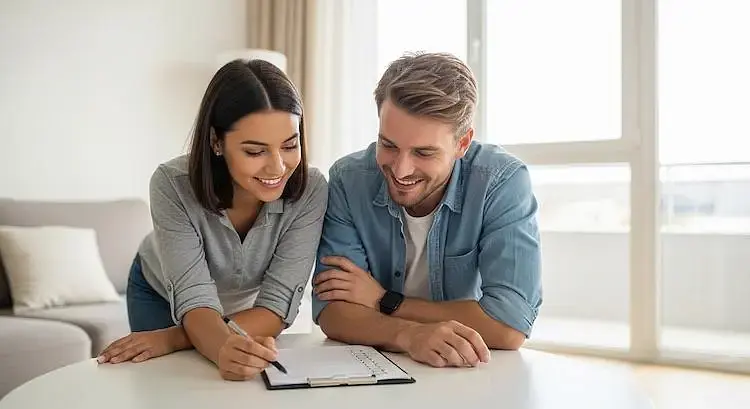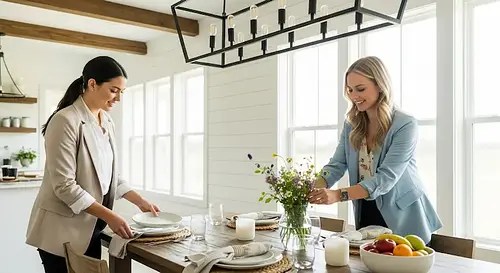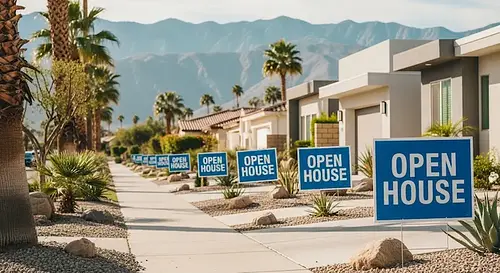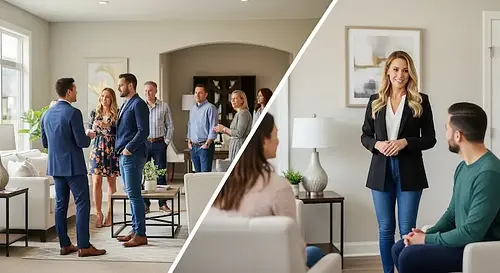Open House Checklist For Buyers
This complete open house checklist for buyers covers everything—from what to bring, what questions to ask, and how to spot red flags, to how to follow up like a pro. Whether you're a first-time homebuyer or just need a refresher, this guide will help you make confident, informed decisions at every step.

Written by Seth Cox
Jul 02, 2025 / Open house marketing
This open house checklist for buyers walks you through exactly what to do before, during, and after the open house—so you can evaluate properties with confidence, spot red flags early, and move forward with the right home for your needs. If you've ever wondered what to bring to an open house, what questions to ask, or how to compare homes like a pro, you're in the right place.
Related: Open House Checklist for Real Estate Agents
Before the Open House – How Buyers Should Prepare
This section of the open house checklist for buyers covers the prep work that sets you up for success.

How to Research a Property Before an Open House
Dig deeper:
- Check the property’s listing history, including price drops and days on market.
- Look at previous sale prices and local property tax records.
- Research zoning details, lot lines, and whether it’s in a flood or fire zone.
You’ll also want to preview the neighborhood using tools like Google Street View. Take note of nearby amenities, traffic patterns, and anything that might affect your daily lifestyle—like proximity to schools, grocery stores, or busy roads.
Evaluate the Neighborhood Before You Visit
Here’s what to do:
- Drive the area at different times of day—early morning, evening, weekends.
- Look for signs of pride of ownership, neighborhood upkeep, and community activity.
- Use apps or websites to research crime rates, school ratings, and future developments.
If the home is in an HOA, read the rules and check the fee amount in advance. Some communities have strict regulations or hidden costs that could influence your decision.
Know What You Want in a Home Before You Go
Create two lists:
- Must-haves – Think number of bedrooms, home office space, school district, garage, backyard, etc.
- Nice-to-haves – Things like a fireplace, walk-in pantry, extra guest room, or updated finishes
Write these down or use a printed buyer checklist so you can quickly assess if the home matches your goals or falls short.

Get Pre-Approved Before Attending Open Houses
Getting pre-approved helps you:
- Set a realistic price range based on your finances
- Avoid wasting time touring homes outside your budget
- Gain a competitive edge if you decide to make an offer
Even if you’re early in your search, a pre-approval gives you clarity and credibility.
What to Bring to an Open House as a Buyer
Here’s what to bring to an open house:
- Smartphone – For taking notes and photos (with permission)
- Measuring tape – To check room sizes or furniture fit
- Checklist or scoring sheet – So you can rate the home objectively
- Water and snacks – Especially if you’re visiting multiple homes
- List of questions – Prepared ahead of time so you don’t forget what matters
Being organized helps you focus on evaluating the home—not scrambling to remember square footage or whether there was enough closet space.

During the Open House – What to Look For and What to Do as a Buyer
Evaluate the Home’s First Impressions
- Condition of the roof, siding, and paint
- Landscaping upkeep and overall curb appeal
- Cracks in the driveway or foundation
- Location relative to busy streets, power lines, or noisy neighbors
How to Evaluate a Home During an Open House Walkthrough
Use this checklist during the open house:
- Do the rooms feel spacious and well-lit?
- Is the floor plan practical for your daily routine?
- Are there signs of natural light or dark, closed-off spaces?
- Can your current (or future) furniture fit in these rooms?
- Are storage areas—closets, pantries, garage—adequate?
Bring a measuring tape to confirm room dimensions and doorways. Take pictures (with permission) to help you compare homes later.
What to Look for at an Open House: Red Flags and Problem Areas
Look for these potential red flags:
- Water stains on ceilings or walls (especially in bathrooms and kitchens)
- Cracks in drywall or uneven flooring
- Soft spots, sloping, or creaking when you walk
- Strong air fresheners (which may be covering odors or mildew)
- Mold, water damage, or rot under sinks or around windows
- Windows or doors that stick when opening or closing
Check the functionality of:
- Light switches and outlets
- Faucets, showers, and toilets
- Appliances (if included in the sale)
- Heating and cooling vents in every room
If you see something that doesn’t sit right, jot it down and follow up with your agent—or the listing agent on-site.

Questions to Ask at an Open House
Here are key questions to ask at an open house:
- Why is the seller moving?
- How long has the home been on the market?
- Have there been any price changes or offers?
- Are there any known issues or upcoming repairs?
- How old are the roof, HVAC, water heater, and major appliances?
- Are there HOA fees, rules, or special assessments?
If anything looked off during your tour—cracks, smells, damage—ask directly about it. The agent is obligated to disclose known material facts.
Open House Checklist Tip: Score the Property Before You Leave
- Layout and flow
- Interior condition
- Storage and functionality
- Location and surroundings
- Overall fit for your lifestyle
This is one of the most overlooked open house tips for buyers—but it’s what helps you stay objective and make smart decisions later when homes start to blend together.

After the Open House – What to Do Next as a Buyer
Here’s exactly what to do after an open house as a buyer.
Review Your Notes and Photos While It’s Fresh
Ask yourself:
- Did this home check the boxes on your must-have list?
- How did it feel emotionally—could you see yourself living there?
- Were there any red flags or lingering concerns?
If you visited multiple homes in a day, rate or rank them while your memory is still clear. You’ll thank yourself later.
Compare Homes Objectively
Use a home comparison worksheet or spreadsheet to rate:
- Layout and functionality
- Overall condition and age of major systems
- Neighborhood and commute
- School districts, HOA rules, and fees
- Price and estimated monthly costs
Even small differences—like garage size, closet space, or outdoor maintenance—can have a big impact over time.
Research Comparable Sales and Neighborhood Trends
Here’s how to do it:
- Check recently sold homes with similar size, features, and condition
- Use platforms like Redfin or Zillow’s “Recently Sold” filter
- Ask your real estate agent to run a CMA (Comparative Market Analysis)
Also look at price trends for the neighborhood: Are values rising? Holding steady? Declining? This can influence both your offer strategy and long-term investment potential.
Follow Up with the Listing Agent or Your Realtor
Things to do:
- Ask if any offers have been submitted since your visit
- Request a seller’s disclosure form if you haven’t seen one
- Schedule a second showing for a more detailed walkthrough
- Have your agent reach out to start conversations about offer terms
If you’re not interested in the home, still thank the agent—it’s courteous, and it keeps the door open for future listings they may represent.
Decide on Your Next Move
You might:
- Schedule a second showing to bring a contractor or family member
- Start preparing an offer with your agent
- Request a home inspection contingency or appraisal clause
- Keep the home on your short list and continue searching
Whatever your next step, the key is to stay organized and intentional. The best buyers aren’t rushed—but they are ready.

Frequently Asked Questions About Open House Visits for Buyers
What questions should I ask at an open house as a buyer?
- Why are the sellers moving?
- How long has the home been on the market?
- Have there been any price changes or offers?
- Are there any known issues or upcoming repairs?
- What’s included in the sale (appliances, fixtures, etc.)?
- Are there HOA rules or fees?
Can I go to an open house without a real estate agent?
Just remember: if you’re working with an agent, don’t register with a different one at the open house, or it may create confusion or conflicts later.
What should I bring to an open house as a buyer?
- Smartphone or camera (for photos and notes)
- Measuring tape (to check dimensions or furniture fit)
- Buyer checklist or scoring sheet
- List of prepared questions
- Water and snacks (especially if touring multiple homes)
- Slip-on shoes (some homes ask you to remove them)
How many open houses should I attend before buying a home?
- Understand your must-haves vs. nice-to-haves
- Can quickly spot red flags or poor layouts
- Feel confident comparing price vs. value
What should I look for at an open house that’s not obvious online?
- Check for smells, water damage, or uneven floors
- Open windows and doors to test functionality
- Observe natural light and noise levels
- Walk the surrounding block or neighborhood
- Look for signs of deferred maintenance or poor repairs
These in-person observations often make or break a buyer’s decision.

Conclusion: Use This Open House Checklist to Make Smarter Buying Decisions
Let’s recap what to do at every stage:
- Before the open house: Research the property, understand your budget, and get clear on your must-haves.
- During the open house: Observe everything critically, ask the right questions, and take detailed notes.
- After the open house: Review, compare, and follow up with your agent to determine your next move.
Whether you’re just starting your home search or getting ready to make an offer, this guide gives you a proven system to navigate open houses like a pro. Want to take this checklist with you? Stay tuned—we’ve got a downloadable version coming soon to make your next open house even easier to manage.
Agents: Want a better way to capture leads at your next open house?
Create a free account today 👉






